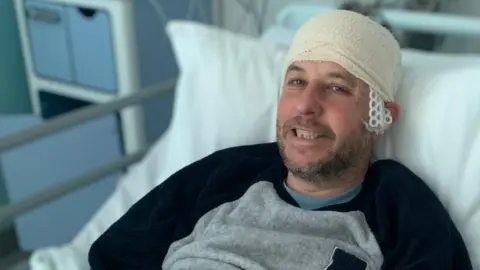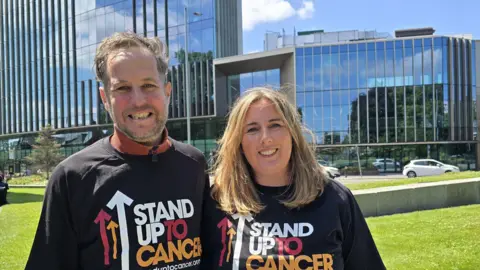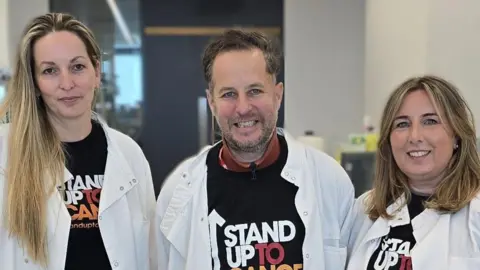Lynette HorsburghNorth West
 Cancer Research UK handout
Cancer Research UK handoutA father with an incurable brain tumour has donated his tears to a pioneering study that could revolutionise how brain cancers are detected because he wants to “make a difference”.
Alex Davies was initially treated for epilepsy but months later scans revealed he had a brain tumour and was told he may only have 12 to 18 months to live.
The 49-year-old is now taking part in research at the Manchester Cancer Research Centre exploring if tear fluid can identify glioblastoma, the most aggressive form of brain tumour.
He is hoping the study will result in earlier diagnoses and ultimately save lives.
Mr Davies, from Lostock, Bolton, started suffering seizures in 2023 before later undergoing surgery, chemotherapy and radiotherapy.
Follow-up scans initially showed no evidence of cancer but later tests discovered the tumour was growing back and he is now receiving palliative care at home.
 Cancer Research UK handout
Cancer Research UK handoutMr Davies, who worked at Network Rail before his diagnosis, said he was relatively fit with no health conditions when he “collapsed out of the blue”.
“It took months to get to my diagnosis and my initial MRI scan didn’t spot the tumour,” he said.
“My symptoms worsened over about three months including severe headaches, my speech became affected as well as my balance and I was getting confused.”
The father-of-two continued: “If helping with this research could mean someone like me can be diagnosed sooner, it offers real hope for the future.”
Mr Davies’ wife Emma said it was a “really horrible time for us”.
She said if a simple tear test could be used to bring a diagnosis forward it “would improve that awful time for so many others in the future”.
Thanks to nearly £500,000 funding from Stand Up To Cancer – a joint fundraising campaign from Cancer Research UK and Channel 4 – the study led by scientists at the University of Manchester has expanded to include larger-scale trials.
 Cancer Research UK handout
Cancer Research UK handoutResearchers have described the test as a “liquid biopsy” and said the “world-first approach” could pave the way for faster, cheaper and less invasive brain cancer diagnosis.
If successful, the test could be rolled out to GP surgeries which would allow patients to receive a diagnosis much earlier.
Prof Petra Hamerlik, who lost her father to glioblastoma at a young age, is leading the project.
She said the research had not previously been explored to diagnose brain cancer.
“My team is currently developing a tear-protein-based classifier that can differentiate brain cancer patients from healthy volunteers with high levels of accuracy,” she said.
“If successful, we’ll seek further funding to develop a tool that can be rapidly deployed across health services, ultimately helping patients like Alex receive a timely diagnosis and better outcomes.”

